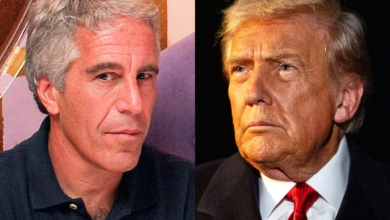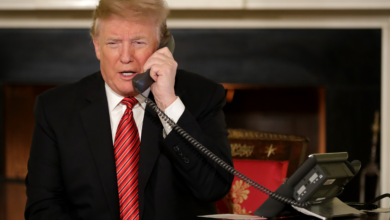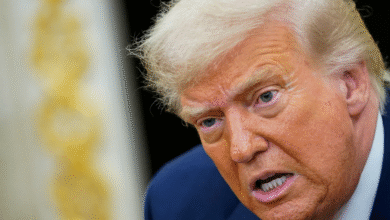US lawyers set up own firms to lead legal fightback in face of Trump onslaught
Several law firms have capitulated to Trump pressure leaving but some lawyers have left to fight government cuts

As Donald Trump launches a vicious attack on big law firms and the Justice Department, some lawyers are forming their own firms, defying the administration’s efforts to cut funding and punish officials.
The decision to create these firms comes at a time when the judiciary is emerging as a bulwark against the Trump administration. More than 200 lawsuits have been filed challenging various Trump administration policies, and more than 70 rulings have been issued preventing the administration from implementing various policies.
Daniel Jacobson thought his knowledge of the specialized rules governing administrative and financial law, which he had accumulated as a senior counsel at the Office of Management and Budget during the Joe Biden administration, would be “completely useless” in normal times. But when the Trump administration quickly began drastically cutting funding for agencies, programs, and groups, he saw a “gap in the market.”
Many of the groups affected by the budget cuts were organizations that couldn’t afford to pay exorbitant legal fees to large law firms. Jacobson, a former partner at Arnold & Porter, believes his specialized knowledge and litigation experience could be useful. He founded his own firm in February.
Jacobson’s decision came at a time when many companies were reluctant to undertake pro bono legal work that would conflict with management’s interests. While Trump issued punitive executive orders against companies that defied him, many of the country’s largest and most prestigious law firms entered into agreements committing to providing pro bono legal services that aligned with the interests of the firm and the Trump administration.
Jacobson’s firm is already handling five cases, including the obstruction of efforts to dismantle the National Endowment for the Humanities and an effort to track Office of Management and Budget appropriations. The firm now employs six attorneys who have previously worked as lawyers at various government agencies, including the Department of Education, the Consumer Financial Protection Bureau, and the Justice Department’s Federal Programs Authority, which represents the executive branch and agencies in civil litigation.
“I don’t have to worry about downsizing for fear of being targeted or anything like that,” Jacobson said in an interview earlier this month. “I can just tackle the issues that I think are important and worth addressing.”
Earlier this year, major law firms reported a significant increase in job applications, as lawyers applied for jobs amid a mass exodus from the civil service. But after firms began making deals with the Trump administration in March, the appeal of working for those firms may have faded. Some lawyers have resigned from major firms in protest.
“The new firms are a response to the political moment and what’s happening to lawyers and other targeted members of society,” said Scott Cummings, a law professor at the University of California, Los Angeles, who studies legal ethics. “They’re doing it in this very specific context, which is great because they also fill the gaps we’re seeing now, where big law firms are no longer interested in bringing cases that might put them on the wrong side of the government,” he added.
Clayton Bailey and Jessica Merry Samuels, two Justice Department lawyers, resigned from their government positions this year and founded their own firm earlier this month, focusing on protecting public servants targeted by the Trump administration.
Bailey was working at the Federal Programs Council when Trump won the election and initially thought there was an opportunity to continue the nonpartisan work that has long been the hallmark of Justice Department lawyers. But he soon realized that wasn’t going to happen.
“Once I felt like I was going to do something illegal and be called upon to defend myself, I knew that wasn’t going to be my place for the next four years,” he said.
He considered joining a nonprofit or a large law firm, but ultimately decided to start his own practice.
“It gives you the independence to be creative at work,” he said.
At least one other prominent lawyer has also recently launched his own career. Abbe Lowell, a veteran Washington lawyer, left his partnership at Winston & Strawn to start his own practice in May to defend officials who have faced attacks from Trump. Their clients include Mark Zaid, a prominent national security lawyer whose security clearance was revoked by Trump; Miles Taylor, a former Homeland Security official whose security clearance was also revoked; and New York Attorney General Letitia James. The firm’s first two hires were Rachel Cohen and Brenna Trout Fry, partners who resigned from their positions at Skadden, Arps, Slate, Meagher & Flom after the firm signed a Trump-friendly deal.
“I was drawn to working in a place where the pace is faster than traditional law firms,” Cohen said. “While many firms are doing important work, the need to move quickly is currently imperative, and the best results are often achieved by smaller, high-performing firms that respond proactively and responsively to the almost daily changes in the American legal system.”







